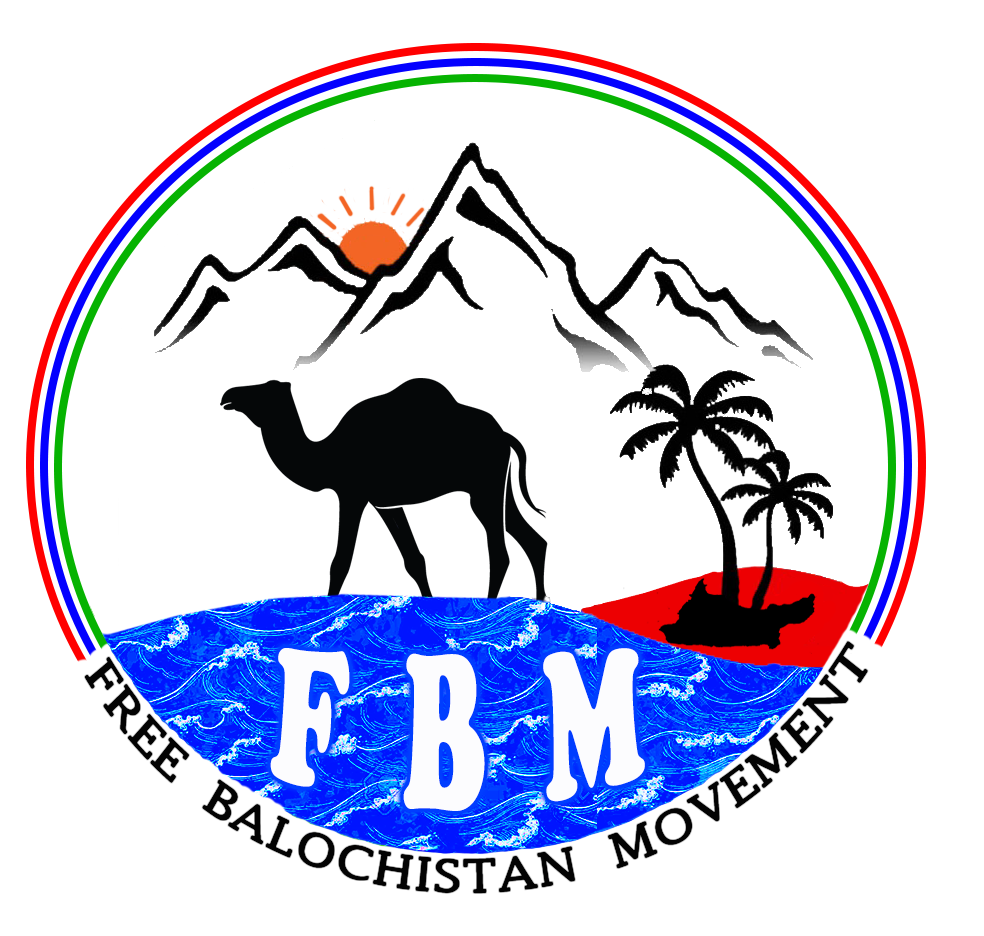
LONDON: The spokesperson of the Free Balochistan Movement (FBM) in a statement said that in the context of the ongoing independence movement in Balochistan, the United Nations labelling the Baloch national struggle as terrorism is tantamount to further encouraging Pakistan to extend its genocide of the Baloch people.
The United Nations must understand that the ongoing national resistance in Balochistan is against the aggression of the Iranian and Pakistani states, for the defence of their national identity and homeland. The Baloch National Army is engaged in the struggle for the freedom of united Balochistan and the restoration of its sovereign status, fighting against the occupying Pakistani and Iranian forces. The day the occupation of Baloch land by Pakistan and Iran ends, the Baloch nation will guarantee complete peace and security within its territorial boundaries.
The spokesperson said that the Baloch struggle for freedom against Iran and Pakistan has been ongoing since the first day of occupation and, even before that, in the 15th century with the Portuguese and in the 19th century with the British, the Baloch nation has always resisted foreign imperialist powers on its soil with collective strength. The current resistance movement in Balochistan is not a new phenomenon, but part of the defensive efforts of the Baloch nation to protect their national identity and collective unity and freedom against the gradual and systematic genocide aimed at keeping them enslaved. This continuity spans centuries.
All nations, including the Baloch nation, have the right to resist occupying powers on every front. History is full of stories of resistance against occupiers and imperialist powers. Today, the United Nations validates Ukraine’s right to resist Russia’s occupation and imperialism. Doesn’t the Baloch also have the same right? This right of resistance has existed throughout human history, long before the establishment of the United Nations.
The statement further mentioned that philosophers like Thomas Aquinas, Niccolò Machiavelli, Francisco de Vitoria, Hugo Grotius, John Locke, Jean-Jacques Rousseau, Immanuel Kant, John Stuart Mill, and Karl Marx have analyzed this human tendency and supported resistance for self-preservation, defence, and opposition to foreign occupation in their writings. Similarly, before the formation of the United Nations, numerous legal agreements and documents like the Westphalia Treaty, the American Declaration of Independence, the French Declaration of the Rights of Man and Citizen, the Hague Conventions, the League of Nations covenant, the Kellogg-Briand Pact, and the Atlantic Charter recognised the right of nations to sovereignty, freedom, resistance, and self-defence. Furthermore, under the United Nations Charter, Pakistan is an occupying power in Balochistan, and Pakistan’s presence in Balochistan violates Articles 2, Sections 3 and 4 of the UN Charter.
Pakistan, by refusing to acknowledge the Balochistan Assembly’s resolutions for maintaining an independent Balochistan and launching a military invasion on the independent state, has violated the United Nations Charter. It is the legal duty of the United Nations to hold Pakistan accountable for these violations and play a role in resolving the Baloch national issue. The United Nations, as a leading institution responsible for global peace, should differentiate between occupiers and the oppressed and ensure that Pakistan and Iran are compelled to halt the Baloch genocide and respect the aspirations for freedom of the Baloch people. However, contrary to this, the United Nations appears unable to comprehend the Baloch struggle for freedom and instead supports the narratives of the occupying powers, which is completely unacceptable to the Baloch nation. The spokesperson of FBM further stated that the Baloch national struggle for freedom is entirely a legitimate movement, consistent with international norms and standards. Just as other national resistance movements against occupation and organised genocide, such as the French and Polish resistance movements, have been globally recognised, the United Nations should understand and acknowledge the Baloch resistance instead of condemning it.
The spokesperson continued that Iran and Pakistan have not only occupied Balochistan but have also carried out a slow-paced genocide of the Baloch people, yet the United Nations has never passed a resolution or even issued a memorandum regarding the severe conditions in Balochistan. On the contrary, the United Nations continues to provide millions of dollars to Iran under the guise of counter-narcotics assistance to curb the supply of drugs to other countries. Here, the question arises: Has the United Nations ever considered how and where Iran, a repressive occupying state, is spending these millions of dollars? The United Nations has consistently ignored the fact that a significant portion of the money allocated for drug control is being used in the Baloch genocide, where thousands of Baloch political activists are hanged under the pretext of drug control and thousands more working in transportation and trade are shot dead simply because they engage in the transport of oil and essential goods due to a lack of alternative employment opportunities. The funds provided by the United Nations are routinely used for the organised genocide of the Baloch people, yet no one is questioning the Iranian occupying state. This is similar to the 2016 orders of the Philippine President to kill all drug-related individuals in one year, which resulted in the killing of 7,025 people. According to Amnesty International many of whom were innocent, murdered based on personal greed, political animosity, and vendettas.
The United Nations has not passed any resolution or memorandum regarding Iran’s state terrorism and human rights violations in Balochistan. Moreover, today, the occupying Iranian and Pakistani forces are demolishing Baloch homes in the name of development and construction. Those Baloch who refuse to vacate their ancestral homes or lands are being subjected to extreme oppression, framed in bogus cases, and many are shot dead. This is being done to turn the Baloch into a minority in their homeland, make Chabahar the capital of the Iranian state, and settle millions of non-Baloch people in the region. Therefore, the Iranian state’s aggression against the Baloch nation demands the full attention of the international community, especially the United Nations, as the guarantor of global peace.
The spokesperson of FBM further mentioned that nearly 5,000 to 6,000 Baloch political activists’ bodies have been found in Pakistan-Occupied Balochistan, and according to human rights organisations’ estimates, thousands of Baloch are in Pakistani state prisons, where they are subjected to inhuman and unethical torture and many are martyred and dumped in desolate areas. However, the United Nations has never found the time to inquire about the fate of so many Baloch who have disappeared. Pakistan, as a signatory to the United Nations human rights conventions, is obligated to ensure the protection of prisoners, including war prisoners, and uphold human rights in occupied territories. However, the United Nations’ support of Pakistan’s narrative against the Baloch nation and its biased stance is causing the Baloch people’s hope in the United Nations to gradually diminish. The Baloch people may eventually begin to see the United Nations as a partner and spokesperson for the oppressive and occupying states.
The spokesperson further said that today, fearing the intensity of the Baloch freedom struggle, the occupying Pakistani and Iranian states are subjecting the Baloch nation to collective punishments. Many Baloch are targeted simply because their relatives are somehow connected to the Baloch freedom struggle. Following recent incidents in Kalat, the Pakistani occupying forces have killed several ordinary Baloch in fake encounters. Moreover, across Balochistan, Baloch civilians are being martyred regularly. This collective punishment is reminiscent of the brutal cleansing campaign led by Pinochet in Chile or the political massacres in Argentina. Today, Balochistan’s political and social landscape is even worse than that, but the United Nations remains oblivious to its responsibilities, complacent in supporting the political agendas and narratives of the occupiers.
In the ongoing struggle for freedom in Balochistan, there are two sides: On one side is the Baloch nation, fighting for the restoration of their stolen national freedom and sovereignty, and for the defence of their homeland, and on the other side is the Pakistani state military and its institutions, which are bent on maintaining their occupation of Balochistan and annihilating the Baloch nation. The United Nations must understand that the Baloch nation’s goal is the freedom of their united land, and the Baloch nation does not believe in violence for the sake of violence or expansionism, as Pakistan and Iran do. Instead, they are struggling for a very important goal, and our efforts are to ensure that the Baloch freedom struggle is in accordance with internationally recognised laws. The Baloch national freedom movement today is a movement for the restoration of the freedom and sovereignty of United Balochistan, and giving it any other colour or name is unacceptable to the Baloch nation.
